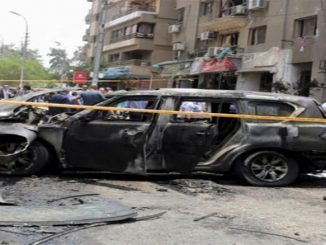
Amnesty International has called on the Egyptian authorities to retry all those convicted in the case known as 174/west Cairo military court before an ordinary, civilian court without recourse to the death penalty and in proceedings that respect international fair trial standards and exclude confessions” and other evidence obtained through torture and other ill-treatment.
In May 2016, Egypt’s military court issued death sentences to 8 defendants in the case 174/2015 west Cairo military court known in the media as “the Developed Mission” case.
The eight defendants were convicted of belonging to a banned group and possessing firearms and explosives. Eighteen others were handed prison terms, while two were acquitted in the same case.
Six of the defendants were tried in absentia, including two of those sentenced to death.
Amnesty also called upon them to open an effective, independent and impartial investigation into the allegations of enforced disappearance, torture and other ill-treatment.
Moreover, it urged them to introduce a moratorium on executions as a first step towards abolishing the death penalty.
Magdalena Mughrabi-Talhami, Amnesty International’s Regional Deputy Program Director for the Middle East and North Africa said, “Sentencing to death men who were tortured into ‘confessions’ is an egregious injustice, even by the degraded standards of Egypt’s justice system.”
She added,”They must receive a fair trial before an ordinary civilian court that meets international standards and excludes torture-tainted evidence, without the recourse to the death penalty.”
Egypt’s Defense Minister Sedky Sobhy has ratified the death sentences on August 21, while the defendants were notified by the decision during the period between September 15 and 21.
The verdict is subject to appeal before a Supreme Military Court for those who were present in court within 60 days of the notification date.
According to according to Amnesty, defendants, arrested between May 28 and June 7, 2015, were subjected to enforced disappearances and their whereabouts were unknown for over six weeks.
‘No Military Trials for Civilians’, an Egyptian rights group , formed by lawyers and human rights activists in 2011, said that“All defendants were subjected to varying periods of torture, 15 days in the case of Omar Mohamed and 44 days in the case of Ahmed El Ghazaly.
Torture varied from being hung by the arms while being weighted down, bring kept blindfolded during entire detention period, electrocution of genitals for relatively long periods, waterboarding, beating with objects set on fire and sexual abuse,” said the local rights group.
In the same context, based on their lawyers’ and their families’ statements, Amnesty reported that the men had wounds that included “burns and bruises on their bodies as well as injuries to their hands” indicating signs of torture.
According to a Human Rights Watch (HRW) report released in 2016, military courts have tried at least 7,420 Egyptian civilians since October 2014, when Abdel Fattah al-Sisi decreed a new law that expanded military court jurisdiction.



